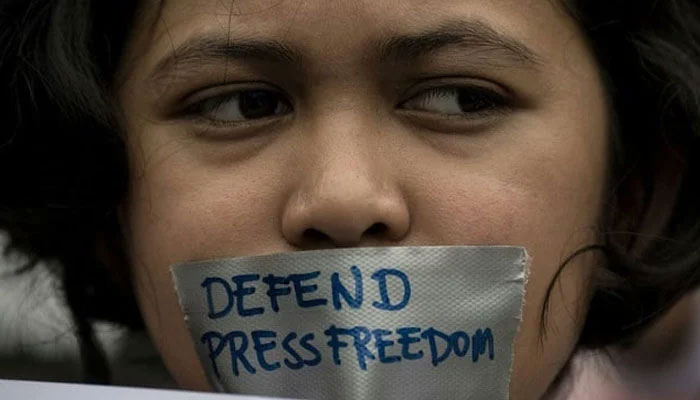An ill-advised law
PPP has also distanced itself from this law and abstained from voting
Much has been said about the Punjab Defamation Act of 2024 which has already been passed by the Punjab Assembly on May 20. It is a bad law and should never have been tabled in the first place.
Its passage – much like that of similar legislation targeting freedom of speech and expression by most governments in Pakistan – happened very quickly and without much debate and amid vociferous opposition by the opposition Sunni Ittehad Council (mostly PTI) MPAs.
The PPP, which has the third highest number of seats in the Punjab Assembly after the ruling PML-N, has also distanced itself from this law and abstained from voting. Now there is news that the Punjab governor (a PPP nominee) will most likely send the bill back to the Assembly for review.
The law is bad for various reasons.
First of all, it gives the impression that the PML-N government is desperate to counter the fake news and propaganda that often comes on social media against it. Yes, there is no denying that Twitter/X especially is rife with fake news and disinformation against the PML-N – and in particular against Punjab Chief Minister Maryam Nawaz.
But the way to counter it is not to have a law that clearly overreaches natural justice. For example, it allows the imposition of a fine of up to Rs3 million on someone accused of spreading fake news and without a trial. This goes against the very basic principle of justice: a person is presumed innocent until proven guilty. So how can the imposition of such a fine without a trial even taking place be justified by those pressing on with this legislation?
Furthermore, for the first time in Pakistan, a law on defamation is also including as a journalist and an editor anyone who posts on a social media platform and who owns a social media account with a wide following.
The rationale behind this expanded definition of ‘journalist’ and ‘editor’ is understandable and makes sense because in today’s Pakistan, the bulk of fake news and disinformation originates and circulates on social media platforms, and one cannot deny that something needs to be done to counter it.
First of all, if an allegation is true and made in the public interest then it does not qualify as defamation. However, news or claims proven to be fake and made willfully to deliberately malign and defame an individual, a government official, a state institution or a political party already comes within existing laws, such as Article 19, or the Defamation Ordinance of 2002, or the PECA laws.
All of these are in place, and a better approach would have been to reinforce them to cover the social and digital media angle. This law doesn’t do any of that.
In fact, a closer look at the way the preliminary decree, whereby a tribunal constituted under the said law to treat such offences can pass an order for damages, shows how the law defies basic common sense.
Someone accused of defamation under the law first has to apply for ‘leave to defend’ from the tribunal to be able to defend him/herself. This means that the principle that anyone charged with defamation for making a false claim or for propagating fake news be given the opportunity to defend themselves in a court of law is not applicable under this law. The person must first apply for ‘leave to defend’ from the tribunal and if they don’t do that or are not given ‘leave to defend’ then the tribunal can pass a preliminary decree for damages for defamation.
This situation would mean that a person could be punished with a fine without being given the right to defend the defamation charges against them. The right to a defence should be automatic and there should be no ‘leave to defend’ clause as such.
The law needs to be taken back because it was clearly not thought through and certainly not drafted and vetted by anyone who would be well-versed with the constitution.
The existing laws should be reinforced to cover the fake news and disinformation on social media platforms; these are very much real as an issue and often created to deliberately taint public office-holders, state institutions or the government of the day.
Furthermore, civil society, especially media organizations, need to step up and take the lead as well in countering fake news and disinformation.
They need to train their reporters and editors so that they are equipped with online tools and have the skillset to be able to check and verify fake news and disinformation. This is also in the interest of mainstream media publishers (print, online or TV) since the dissemination and spread of fake news and disinformation directly affects them through reduced readership as people veer towards social media websites and also WhatsApp to get ‘news’.
There should also be public awareness campaigns targeting those who use social media on a daily basis (especially the younger generation) on how to spot fake news, or at the very least verify and check something before blindly forwarding it to their social circles.
The writer is a journalist based in Karachi. He tweets/posts @omar_quraishi
-
 Shocking Details Emerge In Martin Short’s Daughter Katherine's Death Investigation: 'Kept To Herself'
Shocking Details Emerge In Martin Short’s Daughter Katherine's Death Investigation: 'Kept To Herself' -
 Yerin Ha On Stepping Into The Spotlight In Bridgerton Season Four
Yerin Ha On Stepping Into The Spotlight In Bridgerton Season Four -
 Nakiska Ski Area Avalanche Leaves Youth Unresponsive, Second Skier Escapes Unhurt
Nakiska Ski Area Avalanche Leaves Youth Unresponsive, Second Skier Escapes Unhurt -
 Igor Komarov Missing In Bali: Seven Foreign Suspects Arrested In Kidnapping Probe
Igor Komarov Missing In Bali: Seven Foreign Suspects Arrested In Kidnapping Probe -
 'I Swear' Director Kirk Jones Says Bafta Broadcast Mishap Failed Tourette’s Advocate
'I Swear' Director Kirk Jones Says Bafta Broadcast Mishap Failed Tourette’s Advocate -
 Yogurt Shop Murders Solved: 1991 Austin Cold Case Finally Linked To Serial Killer
Yogurt Shop Murders Solved: 1991 Austin Cold Case Finally Linked To Serial Killer -
 Iran Tensions Rise As Trump Says He Is 'not Thrilled' With Nuclear Negotiations
Iran Tensions Rise As Trump Says He Is 'not Thrilled' With Nuclear Negotiations -
 Where Is Calvin Klein's Wife Kelly Klein Now After Divorce And Fashion Fame?
Where Is Calvin Klein's Wife Kelly Klein Now After Divorce And Fashion Fame? -
 Kourtney Kardashian’s Role As Stepmother Questioned
Kourtney Kardashian’s Role As Stepmother Questioned -
 Neil Sedaka Dies At 86 After Hospitalisation In Los Angeles
Neil Sedaka Dies At 86 After Hospitalisation In Los Angeles -
 'Lizzie McGuire' Star Robert Carradine's Reason Of Death Laid Bare
'Lizzie McGuire' Star Robert Carradine's Reason Of Death Laid Bare -
 Lisa Rinna Breaks Silence After Recent Reunion With Andy Cohen: 'I've Pissed Him Off'
Lisa Rinna Breaks Silence After Recent Reunion With Andy Cohen: 'I've Pissed Him Off' -
 Savannah Guthrie Mom Update: Unexpected Visitors Spark Mystery Outside Nancy's Home
Savannah Guthrie Mom Update: Unexpected Visitors Spark Mystery Outside Nancy's Home -
 Elle Fanning Shares Detail About Upcoming Oscars Night Plan With Surprise Date
Elle Fanning Shares Detail About Upcoming Oscars Night Plan With Surprise Date -
 Demi Lovato Spills Go-to Trick To Beat Social Anxiety At Parties
Demi Lovato Spills Go-to Trick To Beat Social Anxiety At Parties -
 Benny Blanco Looks Back At The Time Selena Gomez Lost Her Handrwritten Vows Days Before Wedding
Benny Blanco Looks Back At The Time Selena Gomez Lost Her Handrwritten Vows Days Before Wedding




